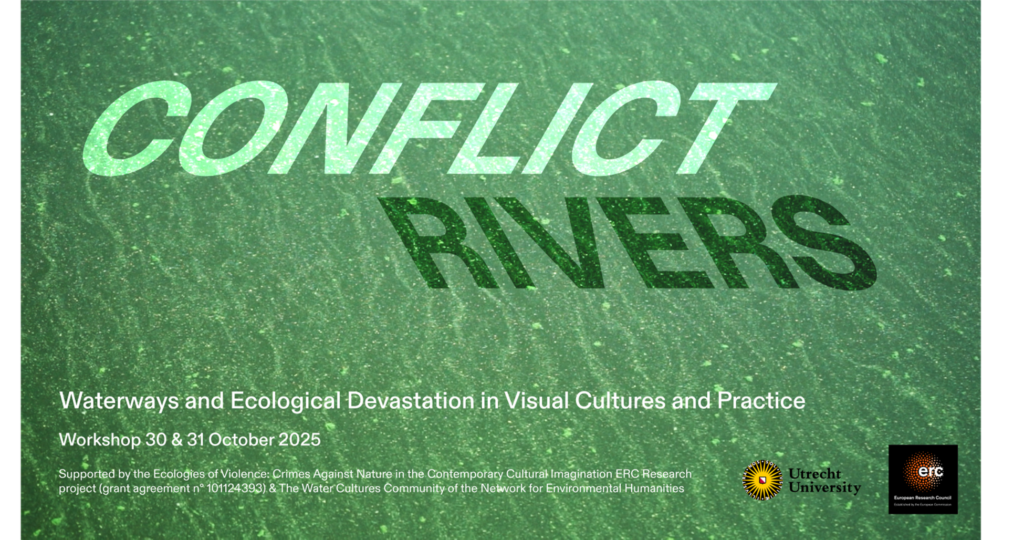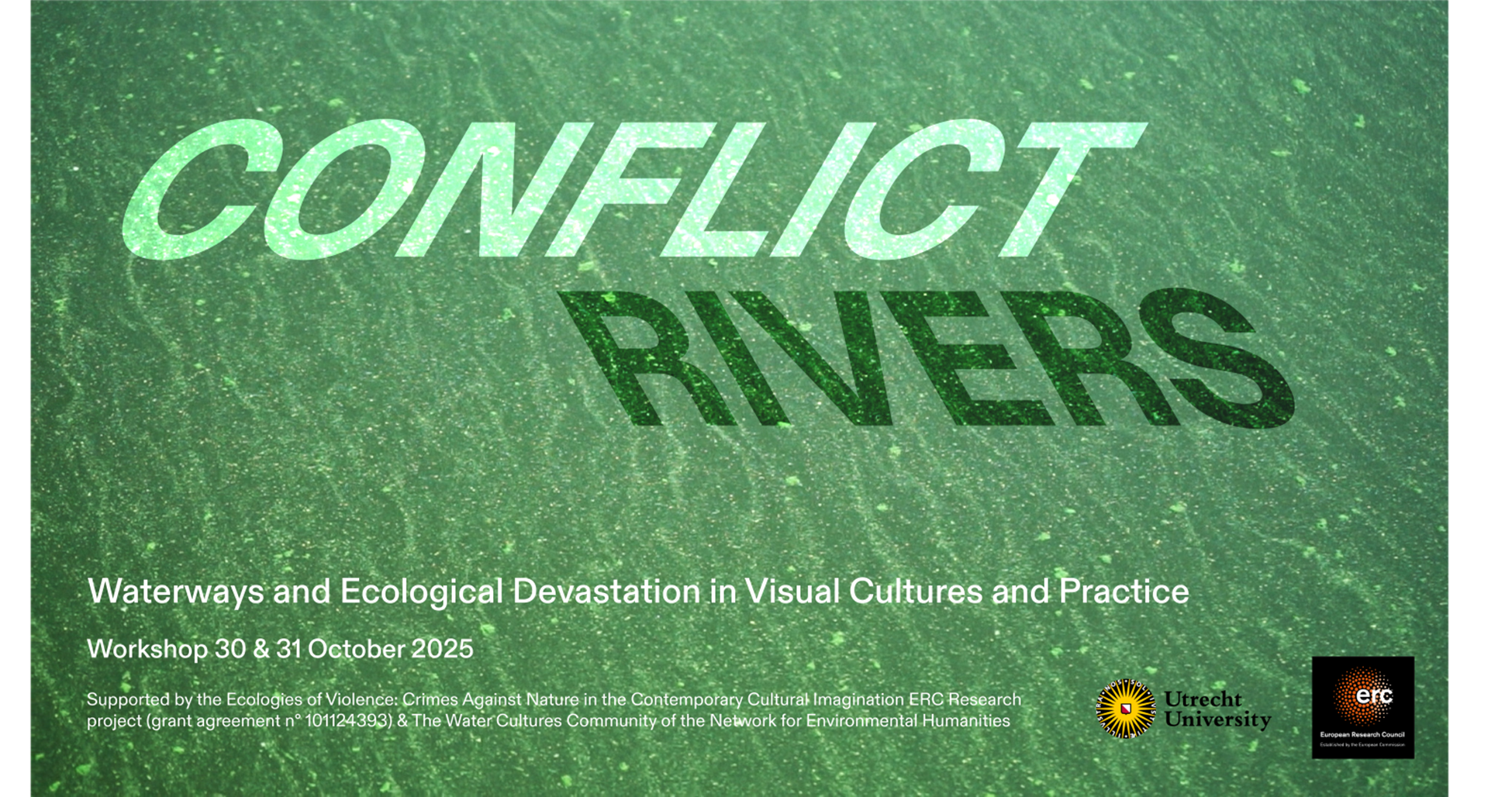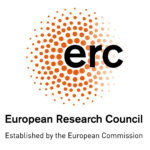Agenda
30-31 October: Workshop ‘Conflict Rivers. Waterways and Ecological Devastation in Visual Cultures and Practice’
Conflict Rivers. Waterways and Ecological Devastation in Visual Cultures and Practice is a workshop hosted by the ERC funded Ecologies of Violence: Crimes Against Nature in the Contemporary Cultural Imagination Research Project and the Water Cultures Community of the Network for Environmental Humanities, and Critical Pathways at Utrecht University and organised by Ifor Duncan.
Rivers are constitutive features of the cultural imagination, the focus of innumerable artworks, literary texts, and cosmologies. Their contestation is central to past, present and future ecological devastation. The thresholds of rivers themselves are sites of conflict between local communities and global finance, property, development, extraction, and exploitation. This workshop invites interdisciplinary researchers, artists and practitioners to think through the forms of creative and spatial practices that attend to riverine and freshwater ecosystems and the multiple and unexpected forms of conflict that they face.
Central to the idea of Conflict Rivers is the activism and ways of living and knowing water that have always persisted before and outside of the devastation of capitalism. Following the 2022 Biennale of Sydney, which drew attention to the root of the word river in the latin rīvus, “also at the origin of the word rivalry” (2021), conflict is used here not only in reference to overt geopolitical or armed conflict over resources (Shiva, 2002) but also the forms of dispute or the organisation of power that pervade contemporary social and environmental forms. This includes what Astrida Neimanis refers to as “everyday militarisms” (2020), or where water is a medium and archive of toxins and pollutants that Michelle Murphy frames as the “alterlife” of chemical relations (2017).
Foregrounding feminist, indigenous, postcolonial, decolonial, and anticolonial thinkers, practitioners and resistance activism, in this workshop we will address the proliferating forms of river conflict and struggles for social and environmental justice across spatio-temporal scales. These include but are not limited to overt cases of river borders, the displacement of populations through hydropower, the colonial legacies of water management and infrastructure as well as river logistics, financialisation, transboundary geopolitics, genocide, public health, food security, microbial, sedimentary and multispecies river life. These themes will be situated within the ongoing discourse of the rights of nature and ecocide. This workshop encounters rivers through their geopolitical and cultural significance, what we might tentatively call an aesthetics of fluvio-geopolitics.

The closed workshop will run over two days with a public evening event on Thursday 30th of October, to which everyone is welcome. For more information on the event, click here.
The closed workshop has the following draft schedule:
Thursday 30 October 2025
Session 1: 10.30 – 12.00 – Rivers and violence – From Law to the Military Industrial complex
- Zsuszana Ihar, ‘Sain the War-River’
- Buhlebenkosi Dlodlo, ‘Liquid Violence: Hydro-politics, Hydro-imaginaries and Living Rivers in Selected South African Texts’
- Jeroen Vos, ‘“They are mafia!”: Civil society struggle against institutional and legal violence in Meuse River waste dumping sites’
Lunch 12.00 – 13.00
Session 2: 13.00 – 14.30 – Water, Memory & Genocide
- Muna Dajani, ‘Thirst, Siege, and Return: Toxic Relations in Wadi Gaza’
- Aya Bsesio, ‘Wadi Gaza river: a case of Israel’s destruction and control of water infrastructure’ – online
- Emilie Glazer, ‘Collectors of Rain: Palestinaian skies, erasure, and the retelling of ritual’
Session 3: 14.30 – 16.00 – River, violence and victimhood
- Austin Zeiderman, ‘Hydrologies of Violence: Visualising Conflict in Colombia Beyond Land’
- Moritz Tenthoff, Documentary on the Cauca river (Placeholder)
- Oscar Pedraza, Investigation into the hydrological impacts of coal mining in La Guajira, Colombia (Placeholder)
Tea/Coffee 16.00 – 16.30
Session 4: 16.30 – 17.30 – Digital Rivers
- Lieke Melsen & Rutgerd Boelens, ‘Digital Twins Rivers, Moral Schizophrenia and Epistemic Violence. How reductionist siblings inform powerful illusions of techno-controlled river matter-realities’
- Miriam Matthiessen, ‘Taking the River Out of the Riverbed: Automated Navigation and the Digital Re-Embodiment of Shipping Labour’
Friday 31 October 2025
Session 1: 10.00 – 11.30 – Rivers, Resistance and Memory
- Merve Bedir, ‘Uncommon River: Concurring Memories and Boundaries of Immanence along Maritsa River’
- Ameneh Solati, ‘Wetlands beyond water’
- Luck Makuyana, ‘Hydro-modernity and the Colonial Legacy of Dam Building in Southern Africa: The Politics of Kariba Dam in Relation to Local Knowledge and Interests of Tonga people’
Tea/Coffee 11.30-11.45
Session 2: 11.45 – 13.15 – Rivers and Plantations
- Avi Varma, ‘Geometries of Hunger’
- Marten Dondorp, ‘Seeing from the River: Riparian plantations, legal aesthetics, and logistical involution’
- Hope Pearl Strickland, ‘a river holds a perfect memory: moving image research in relation to contested river-use in rural Jamaica’
Lunch 13.15 – 14.15
Session 3: 14.15 – 16.15 – River Practices
- Daina Pupkevičiūtė, ‘A song about the Dnipro’
- Laura Giraldo & Carolina Cuevas Parra, ‘Chorus of Singing Rivers’
- Bogna Bochinska, ‘Portrait of the Odra’
- Zakole
Session 4: 16.30 – 18.00 – River Memory
- Veronika Varga, Holtág – Fluvial Afterlives
- Kseniia Bespalova, ‘Fabulating with a river: Matter and Memory in Artists’ Film from Central Asia’
- Elizabeth Gallon Droste, ‘The Snoring of the Bocachico’


